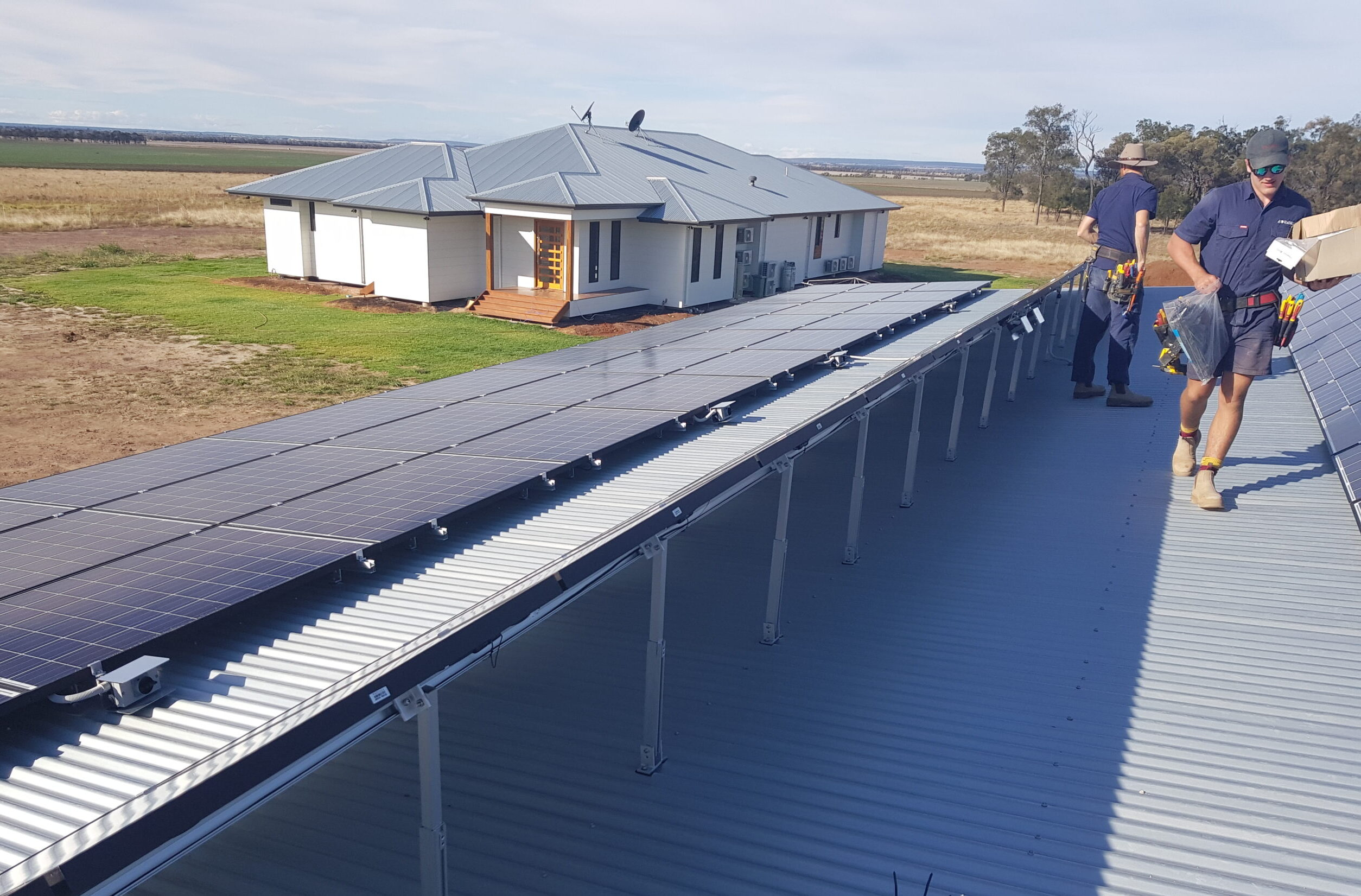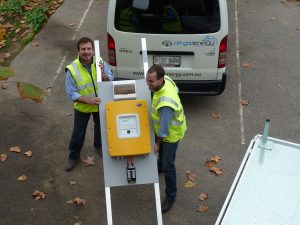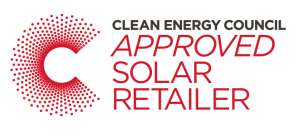

If you’re looking into an off-grid solar system for your home or business, it can often feel like a daunting process. With so many solar companies out there – not to mention all the different brands of panels, batteries, inverters, and even backup generators – it can be hard to know where to start.
We’ve seen the good and the bad, the highs and the lows, and the professionals as well as the fly-by-nighters – and whether or not you contact us for a quote, we hope this article helps you to make an informed decision when the time comes to sign on the dotted line.
Finding your ideal off-grid solar system is about much more than selecting great equipment. You also need to find a company that you completely trust with your investment to design, install, and support your system to the highest possible standards. This confidence allows you to sleep easy knowing you’ll have reliable power 24/7, the system can grow with you as your needs change, and if there’s ever a problem – the installers will be there to get you back up and running.
And so, if you’re looking to get quotes for an off-grid solar energy system, where do you start? What do you need to look for – and what questions should you be asking? Today’s article will cover all of this and more, giving you a much clearer idea of how to go about the process – so let’s take a closer look and find some answers.
The very first step is to ensure the installers are officially certified by the Clean Energy Council (CEC). The CEC is Australia’s governing body of solar installations, and certifies that all recipients have undertaken official training, are up-to-speed with the latest rules and regulations, and work to industry best practice standards.
When it comes to installing off-grid solar systems, there are two types of CEC accreditation to look out for:
At Off Grid Energy, we are both proudly certified by the CEC and an official signatory of the Solar Retailer Code of Conduct. This compliance assures that your system is designed and built to the highest possible standards – backed by our Australian network of qualified and highly-trained installers.
When you first look into buying an off-grid solar system, it can be easy to assume that any company offering solar panels can install every type of solar system. However, it’s vital to understand that grid-connected solar systems (i.e., houses connected to mains power) and off-grid solar systems are two very different things.
And even if a company has installed some grid-connected batteries – such as the Tesla Powerwall – that doesn’t necessarily mean it’s also capable of designing and building a complete standalone off-grid system.
Compared to grid-connect systems, off-grid systems require (among other things) a much more thorough design process, a detailed analysis of property, appliances, and energy consumption, and an expert understanding of different battery technologies.
At Off Grid Energy, our founding team has been designing off-grid systems since 2002, during which time we’ve installed more than 700 off-grid systems in locations all over Australia. With our industry-leading off-grid design software, we pre-build and program your system in our in-house workshop – ensuring a smooth, fast, and aesthetically-pleasing installation.
When your property is connected to mains power, you generally don’t have to think about how much electricity your appliances use or how many hours a day they run for – you’ve always got the grid to provide unlimited power. But when your property is off-grid, and you’re relying entirely on solar and batteries – these are the exact questions that need careful consideration.
One of the first steps in designing an off-grid solar system is a detailed ‘load profile’. In simple terms, it’s a listing of all your appliances and utilities, how much power they consume, how often they’re used, and how much total electricity your property may need at any one time.
At Off-Grid Energy, we take the time to provide step-by-step assistance through this process, carefully assessing your energy demands together with the unique aspects of your property using our specialised design software.
Once we have the correct information, we can design the optimum system for your property. The first important aspect is to ensure that your batteries have enough storage capacity to meet your year-round electricity needs. Secondly, we design a solar array powerful enough to recharge your battery system and store your required amount of reserve energy. Then, with the right solar and battery capacity in place, we also add a monitoring system to track your generation and consumption – and can even include a backup generator for prolonged system health and greater peace of mind.
We also understand that your lifestyle may change and your energy consumption might increase over time. All off-grid systems can be expandable in the future – allowing you to install more solar panels and batteries – provided this is taken into consideration during the design process. If expandability is important to you, be sure to mention this early on, and ask each company to provide options that will meet your specific needs – both now and in the future.
An experienced and reputable off-grid solar company will create a personal quote process that answers all of your specific questions, provides sound advice, and allows you to make an informed decision in your own time.
And if at any stage you start to feel uncomfortable – due to dubious claims, a lack of details, or high-pressure sales tactics – it’s probably a sign to look elsewhere.
In our experience, we advise you to be wary of companies that are quick to offer substantial discounts, speak negatively about their competition, or try to rush you into making a decision. An off-grid solar system is a significant investment that you’ll be relying on 24 hours a day for the next 15+ years – so it’s vital to make sure you get it right.
Two of the most critical areas are also the installer’s system warranties and after-sales support. After all, if your off-grid system fails, you need confidence that your installers will get you up and running again – especially if it’s 6 pm and you’re in the middle of cooking dinner!
In our opinion, the most critical aspect of system reliability is after-sales support, which can cover answering a simple question over the phone – to sending someone out to repair an emergency fault. Reputable off-grid solar companies will offer 24/7 phone support to ensure you can always get help if you need it – so be sure to ask about this during your initial conversations.
You should also perform some online research into a given company’s track-record (more about this in the next section) and read about how their previous customers have fared when they’ve needed technical assistance. Off-grid solar is a significant investment, and no company should sell and install a system unless they’re willing to commit to a long-term service relationship that guarantees your peace of mind.
In addition to technical support, you should also ask about the warranties of each individual product – including the solar panels, batteries, battery chargers, inverters, backup generators, and monitoring systems.
It’s also important to bear in mind that the length of a warranty is not a definitive indicator of quality, and that in some cases even very low-grade manufacturers are willing to make long, unrealistic promises. Our advice is to always perform your own research and seek out independent reviews and ratings – helping you to make a smarter decision about the equipment you’ll rely on to power your home for years to come.
The installation company will also provide a workmanship warranty covering system functionality and supplied components such as wiring, fixings, brackets, and storage cabinets. As a guide, the CEC Solar Code of Conduct recommends a minimum 5-year installation workmanship warranty as the industry best practice.
In our opinion, it’s a good idea to find out how long the company has already been in business – and then compare this with its installation warranty. For example, one company may have been going for 15 years and offer a 10-year workmanship warranty – while another may have only been going for 18 months yet boast a 15-year guarantee.
When all is said and done, anyone can make big promises – but the safest bet is always a reputable company that already has runs on the board.
In this day and age, every reputable company should have an online presence with independent reviews, testimonials, and even case studies offering a detailed analysis of their work. Reading feedback from previous customers is an extremely valuable way to assess the merits of potential installers – while giving you deeper insights into their design, installation, and after-sales support.
Naturally, companies will typically only display positive customer reviews on their own websites, so while they can be helpful, it’s important not to rely on them 100%. If you want independent feedback, you can try 3rd-party solar review sites such as www.solarquotes.com.au and www.productreview.com.au, in addition to searching for the specific company name on Google.
In our opinion, one of the most effective ways to gauge an off-grid solar company is to ask if you can meet with one of their previous customers – and discuss their system, performance and after-sales experiences. You’ll generally find that many people living off-grid are incredibly proud of their sustainable lifestyles – and they’re only too happy to share their knowledge with others looking to do the same.
At Off Grid Energy, we’re proud to have a long list of happy customers that have offered to share their reviews online. You can also read in-depth breakdowns of our previous installations, with details about the customer’s objectives, the equipment we recommended, and the project outcomes.
Questions to ask:
When you seek quotes from multiple installers, you’ll likely receive a range of equipment recommendations, designs, prices, and sales approaches. But at the end of the day, selecting the right off-grid solar company is mostly a matter of trust.
An off-grid solar system is a significant investment, so it’s vital not to make a decision until you’re completely satisfied with the design, price, and process – and you know exactly what to expect once the installers leave your property for the final time. You should select a company with years of experience, keen attention to detail, positive reviews, quality equipment, and a thoughtful process that makes you feel comfortable at every step of the journey.
If you would like some expert advice – backed by almost 20 years of designing and installing standalone solar energy systems – speak with a member of the friendly Off Grid Energy team, or view our information centre for the latest news and updates.




A brief history of how Off-Grid Energy Australia began and it’s early development stages, awards and accomplishments

Have a contingency plan for unexpected power outages of your off-grid power system to ensure any event is less stressful and helps power gets restored quickly.

LED Lights have become a popular low energy lighting option, but as with all new technologies there are some important things to know and pitfalls to avoid.

Off-Grid Energy Australia has signed on to the Clean Energy Council Solar Retailer Code of Conduct, a voluntary scheme authorised by the Australian Competition and Consumer Commission (ACCC).
Off-Grid Energy Australia · Securing your power and your future
Electrical Contractor Licenses: VIC REC-31913, TAS 15608294, WA EC15901, SA PGE278927, NSW 279181C